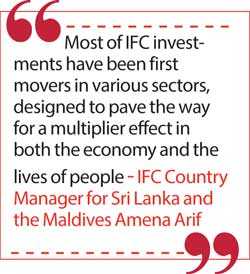Monday Feb 16, 2026
Monday Feb 16, 2026
Tuesday, 9 June 2020 00:44 - - {{hitsCtrl.values.hits}}
Amidst the devastating impact of COVID-19, IFC is stepping up its support for the private sector in Sri Lanka by significantly increasing its investment program—aimed at helping the country recover from the crisis. 2020 also marks IFC’s 50 years of work in the country.
First in a series of planned investments, IFC provided a $ 50 million loan to Commercial Bank of Ceylon (ComBank), Sri Lanka’s largest private bank, to help small and medium sized businesses in the country deal with the adverse economic impacts of COVID-19.
This funding will be used to expand lending to small and medium enterprises, with over a third dedicated to businesses owned by women.
The financing package is part of IFC’s $ 8 billion global COVID-19 fast track financing facility to help businesses and preserve jobs. This investment comes under the Working Capital Solutions Program of the facility, which provides $2 billion in funding to emerging-market banks to extend credit to help businesses shore up their working capital so firms can pay their bills and workers.
IFC has a proven track record of helping countries recover from crisis.
“As we face an unprecedented global crisis, it is imperative that the financing engines of the economy keep running,” said IFC Country Manager for Sri Lanka and the Maldives Amena Arif. “IFC’s rapid support will assist in helping businesses get through this challenging time.”
In Sri Lanka, small and medium sized enterprises make up a large part of the country’s economy, accounting for roughly 52% of the country’s GDP and generating approximately 45% of employment in the country. However, according to World Bank’s South Asia Economic Focus, growth in the country is estimated to have been 2.6% in 2019, an 18-year low. The COVID-19 pandemic is believed to have further weakened growth at the outset of 2020, with the loss of jobs and earnings in key economic growth areas in the country.
IFC’s support will enable ComBank to support small and medium businesses weather the negative impacts of the outbreak, also helping the bank sustain its operations amid a global crisis. 
“Over several decades, Commercial Bank has been a pioneer to provide financial solutions to support the small and the medium business sector of the country, the backbone of the economy of Sri Lanka. We are grateful to the support of IFC management and their team in Colombo and globally for responding positively to our request as they have always done,” said ComBank Managing Director S. Renganathan.
“The funding package was decided after a series of evaluations by IFC teams located in different geographical locations and after showcasing ComBank’s genuine efforts to support SMEs, especially to women entrepreneurs and to SME exporters.”
Over the 50 years of IFC’s operations in Sri Lanka, ComBank has been one of IFC’s longstanding partners – dating back to 2003. IFC has supported ComBank through multiple investments as well as through advisory support, and currently holds a 4.4% equity stake.
In Sri Lanka, IFC has taken a clear approach from the very beginning of its operations in the country: foster innovative partnerships that help create markets and mobilise private sector investments to address critical development challenges. IFC does this by strengthening capacity through its advisory programs to increase readiness for local and international financing as well as by investing in sectors with potential for high development impact.
“Most of IFC investments have been first movers in various sectors, designed to pave the way for a multiplier effect in both the economy and the lives of people,” said Arif.
Promoting social inclusion and opportunities for all is one of the key focuses of IFC’s strategy in Sri Lanka. IFC believes that sustainable growth when underpinned by improved macro-fiscal stability will provide a solid road map for Sri Lanka’s continued development.
During periods of economic crisis, IFC’s role of supporting sustainable economic growth by financing private sector investments, mobilising capital, and providing advisory services to clients becomes more crucial than ever.
IFC believes that its investments during the pandemic-induced economic crisis will also provide critical, countercyclical financing at a time when investor sentiment is wavering—assuring markets that capital investments in Sri Lanka remain viable—potentially creating economy-wide multiplier effect.
“As we mark our 50-year partnership in Sri Lanka this year, we hope that our continued support will help businesses and their employees and suppliers through the immediate aftermath of the pandemic and restore the economy to a sustainable growth path,” said Arif.
IFC—a sister organisation of the World Bank and member of the World Bank Group—is the largest global development institution focused on the private sector in emerging markets. IFC works in more than 100 countries, using its capital, expertise, and influence to create markets and opportunities in developing countries.
In fiscal year 2019, IFC invested more than $ 19 billion in private companies and financial institutions in developing countries, leveraging the power of the private sector to end extreme poverty and boost shared prosperity.